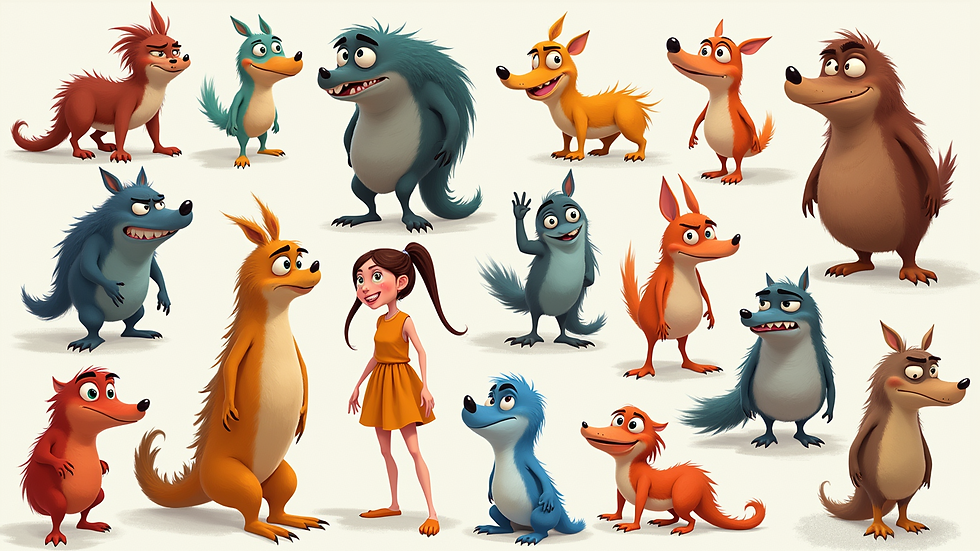Careers In Computer and Film Animation
- PsychicUnderLord (Psychic)

- Aug 14, 2025
- 5 min read
Animation is a vibrant and dynamic field that draws in countless creative individuals. From the charming characters of beloved cartoons to the stunning visuals of hit films, animation brings stories to life in imaginative ways. As technology progresses, the need for skilled animators grows, making this an exciting time to explore a career in this creative industry.
This guide will explore the key aspects of animation careers, including various types of animation, required skills, potential career paths, and tips for entering the industry. Whether you are a passionate artist or considering a career change, this overview provides valuable insights into the exciting realm of animation.
The Different Types of Animation
Animation is not just a single style; it includes a variety of techniques and formats. Familiarizing yourself with these types can help you find an area that matches your interests.
2D Animation
2D animation is one of the earliest forms of animation, known for its flat, two-dimensional look. This style is commonly seen in cartoons and educational videos. Tools like Adobe Animate and Toon Boom Harmony are popular choices for creating 2D animations. For example, classic shows like "Looney Tunes" and modern hits such as "Rick and Morty" showcase the charm and creativity of 2D animation.
3D Animation
3D animation adds depth to characters and scenes, which is why it's widely used in major films and video games. This technique allows for stunning perspectives and more lifelike movement. Popular software used in this field include Autodesk Maya and Blender. Notable films like "Toy Story" and "Frozen" use 3D animation to transport audiences into vibrant worlds with intricate characters.
Stop Motion Animation
Stop motion animation uses physical objects photographed slowly to create motion. Iconic examples of this technique include films like Coraline and The Nightmare Before Christmas. It requires patience and precision, but the end product is often visually striking. For instance, "Wallace & Gromit" has captured hearts through its unique charm and craftsmanship.
Motion Graphics
Motion graphics merge animated graphics with design and are typically utilized in commercials and title sequences. This style is ideal for those with a background in graphic design, focusing on animated text and images. A prime example can be found in Apple's product launch videos, which effectively blend motion graphics to captivate viewers.
Visual Effects (VFX)
Visual effects enhance live-action footage with breathtaking visuals. VFX artists work alongside filmmakers to integrate computer-generated elements seamlessly. Tools like Adobe After Effects and Nuke are standard in this area. Movies like "Avatar" and "Inception" showcase how VFX can create incredible cinematic moments that are beyond what is achievable with cameras alone.

Essential Skills for Animators
To thrive in the animation industry, you need a range of skills. Creativity is essential, but technical know-how and soft skills matter too.
Artistic Skills
A solid foundation in drawing and design is key for animators. Understanding anatomy, perspective, and color theory helps in creating engaging characters and settings. For instance, animators often practice sketching everyday objects or characters to improve their skills.
Technical Proficiency
Knowing how to use animation software is vital. Whether 2D or 3D, being familiar with tools can greatly enhance your job prospects. Many animators recommend starting with beginner-friendly software like Moho or Pencil2D, and then advancing to more complex ones like Maya.
Storytelling Ability
Storytelling lies at the heart of animation. The ability to express emotions and narratives through visuals is crucial. Strong understanding of pacing and character development can make animations resonate more with audiences. For example, “Up” by Pixar effectively uses storytelling techniques to tug at heartstrings right from the start.
Attention to Detail
Animation is a detailed process, and careful observation is necessary. Small details can significantly impact the final animation. The subtle movements in films like "Zootopia" show the importance of fine-tuning every aspect of a character's actions.
Collaboration and Communication
Animation projects often require teamwork. Clear communication and the ability to work with directors, writers, and sound designers is essential for success. Having good collaboration skills can lead to more coherent and enjoyable projects.
Career Paths in Animation
The animation industry offers numerous career paths, each with distinct focuses. Here are some prominent roles you might consider:
Animator
Animators create animations in either 2D or 3D formats. They work directly with directors to ensure their vision is realized. According to the U.S. Bureau of Labor Statistics, the employment of animators is projected to grow by 16% from 2018 to 2028, faster than the average for all occupations.
Character Designer
Character designers shape how characters appear and behave. They produce sketches and models that reflect a character's personality. Successful character designers often participate in creating iconic characters like SpongeBob from “SpongeBob SquarePants.”
Storyboard Artist
Storyboard artists visualize scenes, mapping out the narrative’s flow before the animation process begins. Their work is crucial in pre-production, ensuring the story is effectively communicated. For example, storyboard artists played an essential role in the development of beloved animated movies like “The Lion King.”
Visual Effects Artist
VFX artists create jaw-dropping special effects that enhance live-action footage. They ensure a seamless blend between reality and CGI, as seen in films like "Jurassic Park." Their expertise sparks wonder and amazement among audiences.
Animation Director
Animation directors oversee projects from conception to completion. They guide the creative vision and collaborate with teams to keep production on track. This role is pivotal in shaping the final product's styles and narratives.

How to Get Started in Animation
If you are eager to pursue an animation career, here are some practical steps to guide you:
Build Your Skills
Focus on improving both your artistic and technical skills. Online courses or workshops can be valuable resources. Regular practice is crucial in developing your unique style.
Create a Portfolio
Your portfolio is critical in the animation field. It should showcase a variety of your work, highlighting your skills and creativity. Ensure it's well-organized and visually appealing to make a strong impression.
Network
Networking is essential in animation. Attend industry events, engage in online communities, and connect with other professionals. Establishing relationships can lead to valuable job opportunities.
Gain Experience
Look for internships or entry-level roles to gain real-world experience. Even if the role is not ideal, the skills and connections you build will be beneficial in your career journey.
Stay Updated
The animation industry evolves rapidly, constantly introducing new technologies and trends. Keeping informed about these changes will help you remain relevant and competitive.
The Future of Animation Careers
As technology advances, the animation industry is set for growth. New opportunities stem from virtual reality (VR) and augmented reality (AR), allowing for immersive experiences. Additionally, the demand for animated content across sectors like education and healthcare is rising.
Animators willing to adapt and learn new skills will find themselves in high demand. The future is full of promise for those ready to unleash their creativity in the thrilling world of animation careers.

Your Journey Awaits
A career in animation is more than a job; it offers a platform to express creativity and share powerful stories with audiences worldwide. With numerous paths to explore and a growing demand for skilled professionals, now is an ideal time to step into this vibrant industry.
Whether you want to create animated films, design characters, or work on visual effects, the world of animation presents endless opportunities. So, embrace your creativity, sharpen your skills, and embark on an exciting career in animation. Your adventure begins today!



Comments